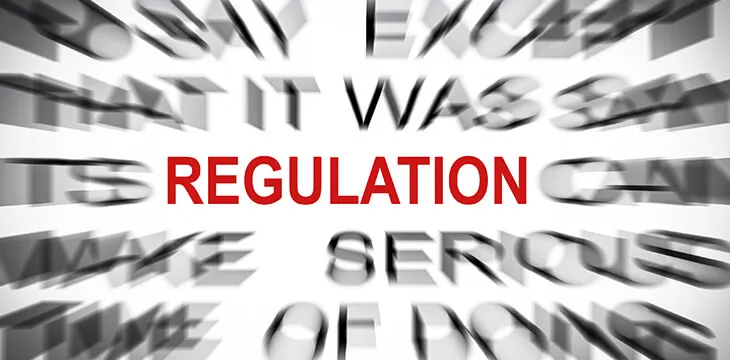|
Getting your Trinity Audio player ready...
|
Securities and Exchange Commission (SEC) Chairman Gary Gensler recently testified before the U.S Senate and outlined his position regarding the regulation of key financial areas. Unsurprisingly, one of them was what Gensler coined “crypto assets.”
Gensler was appointed Chairman of the SEC in 2021 and hasn’t been shy about taking aim at the unlawful, unregulated nature of the digital currency markets and their potential danger to wider financial stability. Not long ago, he likened the current industry to the “Wild West,” a sentiment he reiterated in the Senate hearing as he repeated his determination to bring the space into alignment with financial laws and regulations.
While this type of statement typically causes “crypto bros” to go into meltdown on social media, Gensler outlined some good reasons for wanting the industry to be regulated and offered some modest and perfectly reasonable proposals. Let’s look closer at what he said.
Gensler’s Senate testimony – A quick breakdown
- Gensler began by singing the praises of U.S. capital markets and the need to protect them. He emphasized that they represent 35% of global capital markets and that the agency covers all aspects of the $110 trillion capital markets.
- He highlighted that the only reason the U.S. capital markets are so deep and large is because of the country’s commitment to strong investor protections. This is a key point that seems lost on many of the anti-law, anti-regulation types in the digital currency industry.
- He spoke of the SEC’s commitment to protect the capital markets and prepare them for global competition. He specifically mentioned five key areas he’d asked his staff to focus on, including “crypto assets.”
- He mentioned that the current digital currency markets were rife with “fraud, scams, and abuse…” He emphasized the SEC’s desire to work with other regulators such as the CFTC to fill the gaps and bring in stronger investor protections.
At CoinGeek, we’ve been covering the crime-spree within this industry for a long time, so Gensler’s testimony is no shock to us. You can read all about it in our Crypto Crime Cartel series. It covers everything from laundering money for Colombian cartels to illegal insider trading by major exchanges and more.
We’ve also been preaching the need to get ready for regulatory crackdowns and compliance for years. It’s obvious to anyone who thinks clearly that powerful government agencies were never going to wave the white flag and allow old schemes and scams to present themselves dressed in new high-tech disguises. Also, despite what the code is law crew thinks, technology must change to abide by the law and not the other way around. This moment was always coming, and now it is upon us.
There’s no escaping the law…for real
If you’ve been paying attention, you’ll know that Gensler’s comments are indicative of the overall trend towards stricter regulation, a crackdown on rogue projects that believe securities laws don’t apply to them (ETH 2.0 look out), and the inevitable reckoning that was always going to come as the industry matures and regulators get to grips with the key players, technologies, and trends.
Developers who are concerned with the direction this is going shouldn’t be. Instead, they should build on legally compliant, scalable platforms like Bitcoin enterprise blockchain. Gensler himself said, “Nakamoto’s innovation is real” back in August, giving it his tacit approval, and since Satoshi Nakamoto issued all 21 million bitcoins at zero value and distributes them to miners for doing work, it’s the only protocol in the space that you can be sure does not fit the definition of a security.
As regulatory crackdowns continue, these subtle details that prove the true genius of Satoshi Nakamoto and how carefully he thought out the design of Bitcoin will become increasingly apparent.
The current state of play in the digital currency industry
While powerful social media personalities and supposed thought leaders in the industry continue to promote the idea that there’s nothing any government can do to stop BTC (while simultaneously flying into fits of panic-stricken outrage when regulations are proposed), the truth is that the effort to tame the industry is well underway. Consider the following:
- Executives from Tether, the largest stable coin by market cap, which is responsible for most of the volume of digital currency exchanges, are under investigation by the DOJ over alleged bank fraud.
- Binance, the largest digital currency exchange, has been banned by banks in many different countries this year and is facing increased regulatory pressure across the world. It’s allegedly now under investigation for insider trading.
- Coinbase (NASDAQ: COIN), which recently went public on the NASDAQ, is now under fire by the SEC, which is suing it for its LEND product. In an embarrassing Twitter rant, Coinbase CEO Brian Armstrong showed that he didn’t even understand the legal definition of a security.
1/ Some really sketchy behavior coming out of the SEC recently.
Story time…— Brian Armstrong (@brian_armstrong) September 8, 2021
And this is just the tip of the iceberg. You can bet your bottom dollar that if the SEC Chairman is testifying to the U.S. Senate that the agency is going to get tough on the digital currency industry, and is going to cooperate with other agencies like the CFTC, then there’s a lot more to come.
BSV is ready for a legally compliant industry
Like it or not, the existing laws apply to digital currencies and always have. BSV has always taken this approach and has prepared accordingly. As the future unfolds and the inevitable lawsuits, jail sentences, and platform closures and seizures begin over the next few years, BSV will remain a stable, legally compliant protocol that scales infinitely.
If you take the time to investigate for yourself and see through the smoke and mirrors of the industry, you’ll understand that Satoshi Nakamoto designed Bitcoin to be this way. It’s not the underground railroad that BTC proponents promote it as. It’s an infinitely scalable platform that can serve as the base layer protocol for a new world, and it’s 100% legally compliant.
Watch: SEC Commissioner Hester Peirce discusses “Blockchain Policy Matters” with Bitcoin Association’s Jimmy Nguyen

 09-17-2025
09-17-2025 





